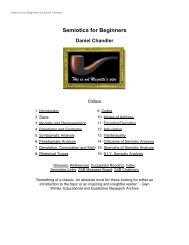Semiotics for Beginners by Daniel Chandler
Semiotics for Beginners by Daniel Chandler
Semiotics for Beginners by Daniel Chandler
You also want an ePaper? Increase the reach of your titles
YUMPU automatically turns print PDFs into web optimized ePapers that Google loves.
<strong>Semiotics</strong> <strong>for</strong> <strong>Beginners</strong> <strong>by</strong> <strong>Daniel</strong> <strong>Chandler</strong><br />
the other' (ibid., 97). Although Lévi-Strauss's analytical approach remains <strong>for</strong>mally synchronic,<br />
involving no study of the historical dimension, he does incorporate the possibility of change:<br />
oppositions are not fixed and structures are trans<strong>for</strong>mable. He notes that we need not regard such<br />
frameworks from a purely synchronic perspective. 'Starting from a binary opposition, which af<strong>for</strong>ds the<br />
simplest possible example of a system, this construction proceeds <strong>by</strong> the aggregation, at each of the<br />
two poles, of new terms, chosen because they stand in relations of opposition, correlation, or analogy<br />
to it'. In this way structures may undergo trans<strong>for</strong>mation (ibid., 161).<br />
Lee Thayer argues that 'what we learn is not the world, but particular codes into which it has been<br />
structured so that we may "share" our experiences of it' (Thayer 1982, 30; cf. Lee 1960).<br />
Constructivist theorists argue that linguistic codes play a key role in the construction and maintenance<br />
of social realities. The Whorfian hypothesis or Sapir-Whorf theory is named after the American<br />
linguists Edward Sapir and Benjamin Lee Whorf. In its most extreme version the Sapir-Whorf<br />
hypothesis can be described as relating two associated principles: linguistic determinism and<br />
linguistic relativism. Applying these two principles, the Whorfian thesis is that people who speak<br />
languages with very different phonological, grammatical and semantic distinctions perceive and think<br />
about the world quite differently, their worldviews being shaped or determined <strong>by</strong> their language.<br />
Writing in 1929, Sapir argued in a classic passage that:<br />
Human beings do not live in the objective world alone, nor alone in the world of social activity<br />
as ordinarily understood, but are very much at the mercy of the particular language which has<br />
become the medium of expression <strong>for</strong> their society. It is quite an illusion to imagine that one<br />
adjusts to reality essentially without the use of language and that language is merely an<br />
incidental means of solving specific problems of communication or reflection. The fact of the<br />
matter is that the 'real world' is to a large extent unconsciously built upon the language habits<br />
of the group. No two languages are ever sufficiently similar to be considered as representing<br />
the same social reality. The worlds in which different societies live are distinct worlds, not<br />
merely the same world with different labels attached... We see and hear and otherwise<br />
experience very largely as we do because the language habits of our community predispose<br />
certain choices of interpretation. (Sapir 1958, 69).<br />
This position was extended <strong>by</strong> his student Whorf, who, writing in 1940 in another widely cited<br />
passage, declared that:<br />
We dissect nature along lines laid down <strong>by</strong> our native languages. The categories and types<br />
that we isolate from the world of phenomena we do not find there because they stare every<br />
observer in the face; on the contrary, the world is presented in a kaleidoscopic flux of<br />
impressions which has to be organized <strong>by</strong> our minds - and this means largely <strong>by</strong> the linguistic<br />
systems in our minds. We cut nature up, organize it into concepts, and ascribe significances as<br />
we do, largely because we are parties to an agreement to organize it in this way - an<br />
agreement that holds throughout our speech community and is codified in the patterns of our<br />
language. The agreement is, of course, an implicit and unstated one, but its terms are<br />
absolutely obligatory; we cannot talk at all except <strong>by</strong> subscribing to the organization and<br />
classification of data which the agreement decrees (Whorf 1956, 213-4; his emphasis).<br />
The extreme determinist <strong>for</strong>m of the Sapir-Whorf hypothesis is rejected <strong>by</strong> most contemporary<br />
linguists. Critics note that we cannot make inferences about differences in worldview solely on the




